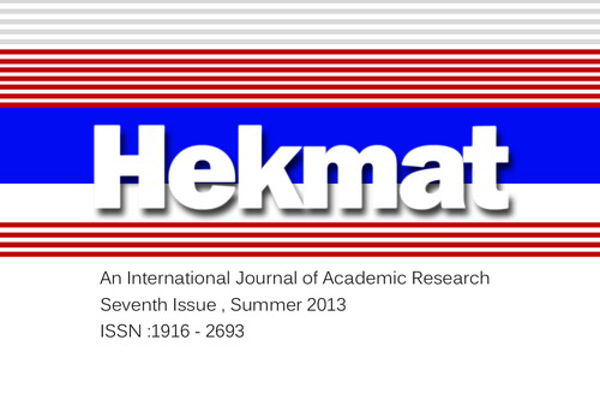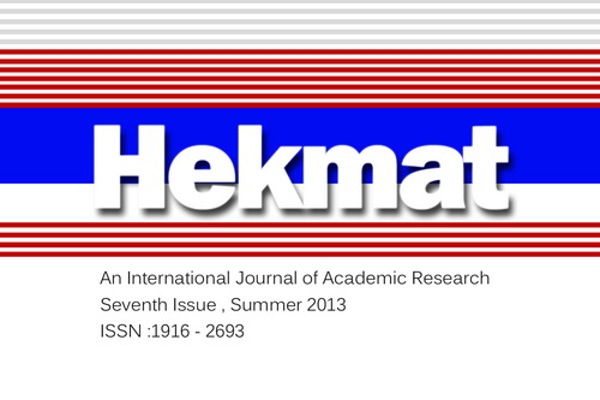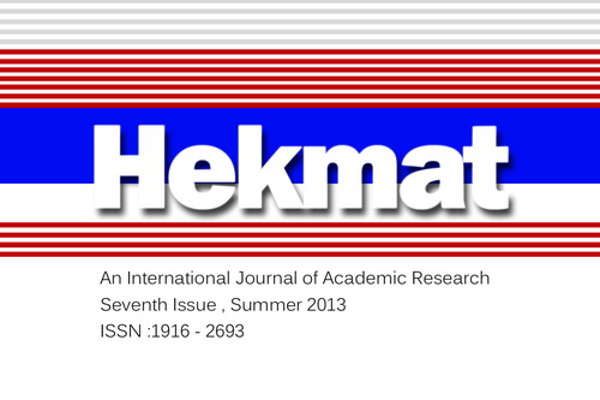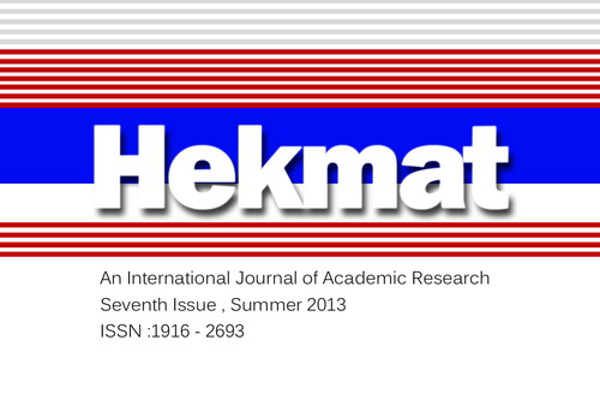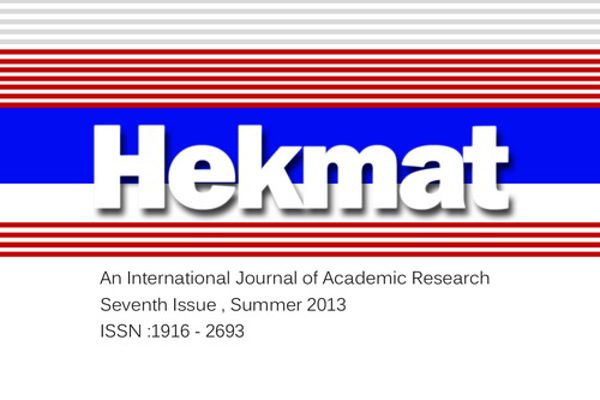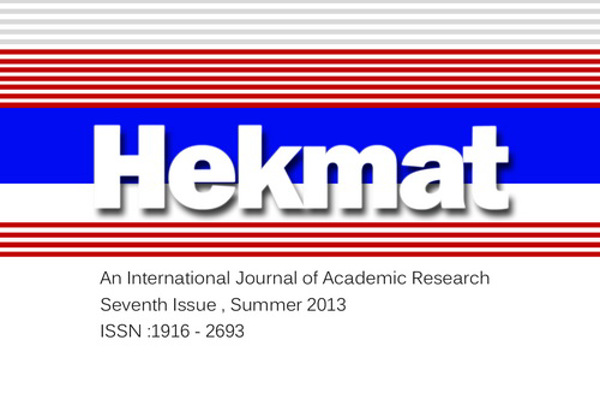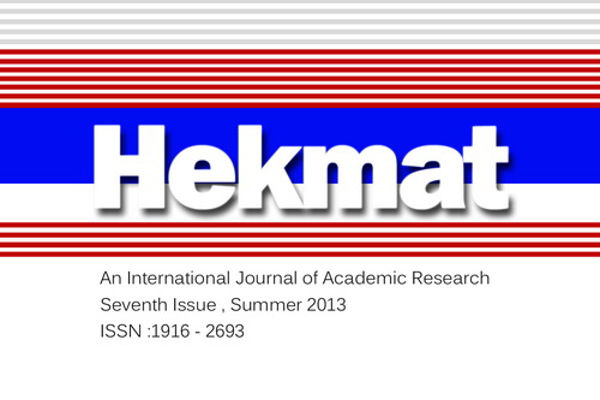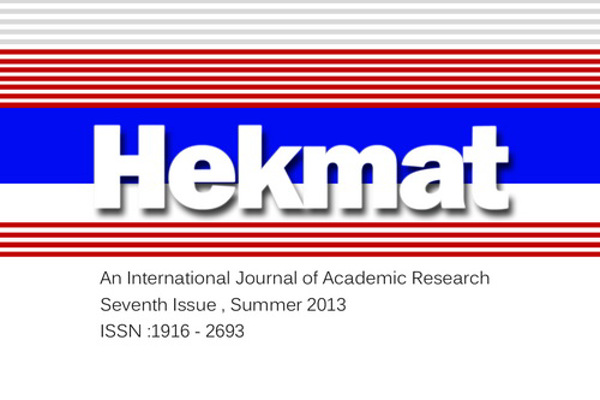Editorial
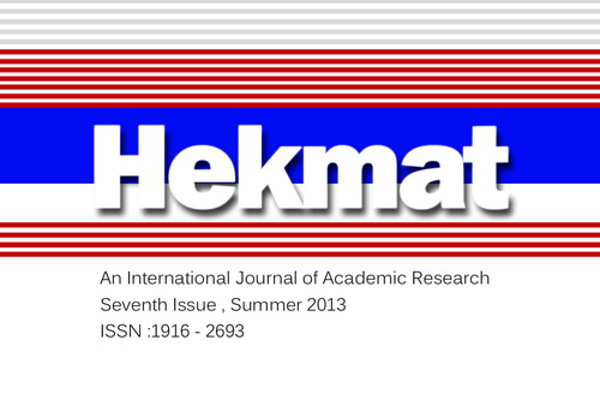
Editorial
Like any other animal species, human beings have a number of vital needs which must somehow be met, for, otherwise, some of the human faculties would remain undeveloped. By coming of age, human body reaches the stage of perfection and a new physiological need emerges. Sexual faculty combines a series of physical, emotional, and psychological needs. This faculty is a divine gift necessary for the continuation and survival of human species. As divine wisdom renders the survival of human species necessary, human beings must have been equipped with sexual faculty as an indispensable feature. All capabilities which can be dispensed with may not be vital. So, the survival of human species may not depend on them. Intuition and experience tell us that sexual desire cannot be overlooked. To undermine this instinct jeopardizes human emotional life and leads to problems such as depression, unquenchable sexual thirst, and deviation.
Maybe the most natural way to meet one’s sexual needs is through the historical institution of marriage whereby one selects their lifelong sexual partner in a method that guaranties physical, emotional, and psychological vitality for human beings. However, in modern age, human life has undergone drastic changes that render classic marriage less feasible. In the process of industrialization of nations, the rate of population growth soars, physical health improves, demand for job increases fast while the growth of job opportunities is not as fast, children attain adulthood faster than they used to in the past, sexual stimuli are far more widespread everywhere and colorful now in comparison to preindustrial age, people are mostly well-off financially, and finally, sexual needs are strong and become stronger while the necessary conditions for founding family in the classical way are hard to meet. When failure to satisfy human sexual demands jeopardizes the natural course of life and family as a social institution cannot be set up easily, four alternatives may be sought.
Based on a special understanding of jurisprudential sources, Islamic state may adopt the strategy of inviting young adults to piety and mortification. It may even invoke the verse of the Quran, “and those who are not capable of entering into marriage contract should abstain until Allah enriches them out of His generosity[1]”. Evidently, this verse of the Quran addresses the problem adult men and women face when they virtually cannot meet their sexual needs through marriage. Now, the question may be raised whether in contemporary society actually young adults are unable to meet their sexual needs in any proper manners. When so great number of young men and women seek lawful ways to satisfy their sexual desires and there exist legal solutions from Islamic perspective though abandoned nowadays, it is reasonable to ask why the Islamic state neglects its duty to revive Islamic rules and traditions. Moreover, even though the aforementioned verse of the Quran states the religious obligation of people who actually cannot satisfy their sexual needs lawfully, the responsibility of Islamic state is, in the first place, to take necessary measures to open new channels and enable people to provide for all their needs. It is not rational that the state resorts to such religious precepts as expressed in the aforementioned verse in lieu of facing its responsibilities. Elsewhere, the Quran says, “intimate contact with your wives on the nights of the month of fasting is no more forbidden; Allah knew that you would commit treason against yourselves[2]”. This holy verse says that God knew that people would not tolerate divine command to avoid sexual intercourse for a complete month. Therefore, in order to show mercy on people, He prohibited intercourse during the days of the month of Ramadan when people fast but permitted it during the nights of this month when people do not fast. It goes without saying that people of high religious motivation who always prefer divine will to their own obey all divine orders wholeheartedly. But Sharia addresses average people. So, God does not impose restrictions that normal average people can't forbear. The phrase “intimate contact” used in the verse tells us that normal married people do not bear to refrain from intercourse for a considerable period of time even though other sorts of sexual recreation are available to them. Bearing these points in mind, we should conclude that it is not realistic that Islamic state invites young adults to utterly suppress their sexual desires throughout their prime years of life when their faculties including the sexual are at their zenith until they find a job and be able to afford to form a family. It is obvious that such calls will find only deaf ears turned to them and the responsibility of the government remains unfulfilled.
The situation will become more deteriorated if the state resorts to force to prevent any contact between individuals of the two sexes beyond the traditional institution of marriage in addition to enjoining people to mortification. It is evident that self-control cannot be promoted in society through exercise of power. Measures such as exercise of excessive force or espionage which are incompatible with human rights and dignity and the rights which Islam recognizes for citizens not only fail to achieve their aims but also add fuel to the fire via widening the gulf between the new generation and the community loyal to religious values. This situation gradually sparks resistance against not only religious tradition but also law enforcement.
The second alternative is to work on providing all the necessary means for marriage at the earliest possible opportunity for the youth. Some of these preconditions are job opportunities and independent houses where new families can settle down. Taking into account the rapid growth of population, the number of young people reaching adulthood is constantly increasing. Economic and social development in the majority of societies in developing nations does not, however, keep pace with population growth. Neither does the physical growth of the youth accompany their proportionate mental development, capacities, and skills for living independently. Marriage before the age of 25 seems often unlikely to be successful nowadays because the mental, emotional, and rational maturity is scarcely ripe before that age, the economic situation of families and the overall economic status of developing nations cannot provide financial support for early marriage of adolescents, and shared life in extended families under one roof that once was so widely spread and popular in our societies is hardly feasible now. In traditional society, adolescents used to learn and acquire techniques and skills needed for entering the job market of simple preindustrial economy before coming of age. Most of young married adults used to live with their parents for a considerable time before they could make a house of their own. This period of coexistence of two families let “tradition” as the culmination of human experience pass from a generation to another. Life was much simpler. Far simpler skills were needed to handle a family. But in contemporary industrial life, forming and handling a family is too complicated for individuals between 15 to 20 years of age or older constantly increasing pressure of sexual needs. Therefore, encouraging permanent marriage is not the ultimate solution proper in its place though. Consequently, faced with indifference or inability of the traditional institutions of society to meet their ever intensified sexual demands in the first decade of adulthood, young adults turn their backs to tradition and opt for the Western style of life dominated by hedonism.
Unrealistic approach to the social problem of sexual relationship adopted by Islamic state in the form of focusing on promotion of the traditional institution of marriage exclusively can eventually result in people's faith in the efficiency of religion in general and Islamic state in particular to gradually fade away. This, in turn, widens the gulf between the old and the new generations.
The third alternative is to overlook this problem altogether. The government may choose to close its eyes on the problem and the different solutions people may try. This strategy, in practice, leads to a situation in which people opt for the closest road and the best shortcuts. We should bear in mind that Sharia and reason recommend safe ways of maximizing the benefit from human faculties including the sexual in the least expensive ways. Society, somehow, sets the necessary norms and regulations in order to see this goal materialized. By the intentional negligence of the social problem of sexuality, state decides that the behavior of citizens in this particular field lies outside its legitimate interference and administration. So far, there might be no problem. But there are consequences state cannot overlook. When an Islamic state refrains from interfering in a particular social field, it opens the door for any social norm to be automatically set. These norms may involve cultural elements that bring about tension with the state in the long run. Hedonism originally adopted by some fractions of society as a natural response to the problem of sexual relationship unattended to by the state may gradually evolve into a full scale secularism that challenges religious and traditional symbols and mottos of society first, and goes on to loosen the strictures and threaten the very natural structure of community. In the process of setting automatic norms by society, sometimes, incongruous elements are imported from alien societies. These elements disturb the overall harmony of values and beliefs that direct the natural life of society. Tensions between various factions of society may emerge as the result.
This approach can be criticized from another angle too. In regard to false appetite, it is reasonable to think of negligence as a method for handling the situation. But in the case of real needs, it is not wise to prescribe negligence. Neglecting thirst can never quench. Likewise, neglecting sexual desires is never the ultimate solution. Experience teaches us that such negligence only deteriorates the situation, augments the problem, postpones the treatment, and sometimes makes it too difficult and, at the same time, causes much waste of physical emotional and psychological energy which people can hardly bear. We mentioned earlier that Islam does not set rules which average people cannot obey. Regarding the sexual problem too, Islam will not prescribe a solution beyond the capacity of average people. Hence, the third approach may not be described as Islamic.
The forth alternative is that the Islamic state adopts a realistic approach recognizing the fact that, in the first 10 years of adulthood, sexual drive is strong and active demanding a safe way of satisfaction. As a prelude to this approach, we may remind that several sayings related to the infallible Imams enjoin the faithful to divide their time to three portions dedicating one part to working for their life in the hereafter, one part for provision of their livelihood, and a part to lawful pleasures. These sayings reiterate that dedicated believers shall not underestimate or sacrifice this third part in favor of the other two because their success here contributes to their success there. So, although pleasure is not a goal in itself, it must not be discarded. To overlook pleasure and entertainment leaves adverse effects on both the economic life of the spiritual life of individuals and society.
In materialist societies of the West today, people work with full strength for five days a week in order to be able to enjoy the two days of entertainment at weekends. Therefore, every effort is done to invent new forms of entertainment and recreation. The entertainment industry aims inter alia to provide sufficient incentives for serious work on weekdays. This is partly endorsed by Islamic culture that considers entertainment, recreation, and pleasure as effective tools for the lively involvement of individuals in activities constructive to their life both in this world and in the hereafter. There are numerous other traditions in Islamic culture that elaborate on different dimensions of sexual pleasure. One of them says: “sexual pleasure is the best recreation for the faithful.” Another hadith mentions midnight prayer and sexual pleasure on a par as two forms of entertainment which the faithful enjoy. These hadiths indicate that from an Islamic perspective, lawful sexual pleasure is acknowledged and respected.
As we have already said, in the first decade of adulthood, permanent marriage is not often feasible. It is not recommendable in part of this period. Moreover, a considerable number of mature women and men remain unable to marry because of different obstacles. Bearing these facts in mind, we can tell what approach is more reasonable for the Islamic state to opt for. How can the government realistically handle the problem?
Whatever solution proposed for this problem must be workable. That is, the solution we suggest should not include the problems the traditional institution of marriage involves. It should have a clear framework that guarantees all the rights couples and other individuals somehow affected enjoy at the same time that it facilitates sexual satisfaction in the relatively least expensive manner.
In discussing how Islamic state should react to sexual problem in society, we need consult the resources of Sharia law since Muslims believe that Sharia illuminates the path of wisdom. From Muslims’ viewpoint, reason is not capable of understanding all aspects of human behavior and all the repercussions in spiritual, psychological, material, and emotional life of individuals and community. When some interests of individuals and society can be perceived to be beyond the reach of reason, then Sharia resources are needed to help reason.
A historical social unfortunate phenomenon is observed in our society that accounts for much of the complexities and problems we suffer nowadays. The dominance of Western culture in the last decade has been translated into the call for abandoning Iranian Islamic culture in every field even in the model of clothing. In liberal Western culture, free sexual behavior is preferred to legalized controlled behavior in the framework of a definite contract between the parties that guarantees their rights and the rights of the children who are the probable outcome of the sexual contact. As the result of the encounter of Iranian society with Western culture in the past two hundred years, a strong current has emerged in our society directed by reference groups such as artists, intellectuals, and upper-class society that favors the destruction of our national sexual culture and its replacement with Western sexual culture. Steps taken towards the distortion of Islamic culture have been so well-planned that one can conclude without doubt Western politicians and experts in humanities hostile to Islam masterminded the whole enterprise.
[1]. The Quran: Al-Nur: 33.
[2]. The Quran: Al-Baqara: 187.


